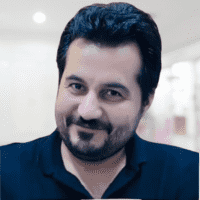Personality Disorders
People have unique personalities made up of a complex combination of different traits. Personality traits affect how people understand and relate to the world around them and how they see themselves.
A personality disorder is a mental health condition where people have a lifelong pattern of seeing themselves and reacting to others in ways that cause problems. People with personality disorders often have a hard time understanding emotions and tolerating distress. And they act impulsively. This makes it hard for them to relate to others, causing serious issues and affecting their family life, social activities, work and school performance, and overall quality of life.

Symptoms of Personality Disorder
Sometimes, you may not know you have a personality disorder. That’s because how you think and behave seems natural to you. Others may also be responsible for your challenges.
There are many types of personality disorders, each with important differences. These disorders are organized into three groups, or clusters, with shared features and symptoms:
Group A personality disorders
Group A personality disorders have a consistently dysfunctional pattern of thinking and behavior that reflects suspicion or lack of interest in others.
They include:
Paranoid Personality Disorder
- Lacks trust and is suspicious of others and the reasons for their actions.
- Believes that others are trying to harm with no reason to feel this way.
- Doubts the loyalty of others.
- Is not willing to trust others.
- He hesitates to confide in others for fear that others will use that information against them.
- Takes innocent remarks or situations that are not threatening as personal insults or attacks.
- Becomes angry or hostile to what are believed to be slights or insults.
- He has a habit of holding grudges.
- Often suspects that a spouse or sexual partner is unfaithful with no reason to feel this way.
Schizoid Personality Disorder
- He appears to be cold to or not interested in others.
- Almost always chooses to be alone.
- He is limited in how emotions are expressed.
- He cannot take pleasure in most activities.
- Cannot pick up typical social cues.
- Has little to no interest in having sex with another person.
Schizotypal Personality Disorder
- Has unusual thinking, beliefs, speech, or behavior.
- Feels or thinks strange things, such as hearing a voice whisper their name.
- Has flat emotions or emotional responses that are socially unusual.
- Has social anxiety, including not being comfortable making close connections with others or not having close relationships.
- Responds to others in ways that are not proper or show suspicion or lack of interest.
- Has “magical thinking”— believing their thoughts can affect other people and events.
- Believes that some casual incidents or events have hidden messages.
Group B Personality Disorders
Group B personality disorders have a consistently dysfunctional pattern of dramatic, overly emotional thinking or unpredictable behavior.
They include:
Borderline personality disorder
- Has a strong fear of being alone or abandoned.
- Has ongoing feelings of emptiness.
- Sees self as being unstable or weak.
- Has deep relationships that are not stable.
- Has up and down moods, often due to stress when interacting with others.
- Threatens self-harm or behaves in ways that could lead to suicide.
- He is often very angry.
- Shows impulsive and risky behavior, such as having unsafe sex, gambling or binge eating.
- Has stress-related paranoia that comes and goes.
Histrionic Personality Disorder
- Always seeks attention.
- Is overly emotional or dramatic or stirs up sexual feelings to get attention.
- Speaks dramatically with strong opinions but has few facts or details to back them up.
- Is easily led by others.
- Has shallow emotions that change quickly.
- Is very concerned with physical appearance.
- Thinks relationships with others are closer than they are.
Narcissistic Personality Disorder
- Has beliefs about being special and more important than others.
- Has fantasies about power, success and being attractive to others.
- Does not understand the needs and feelings of others.
- Stretches the truth about achievements or talents.
- Expects constant praise and wants to be admired.
- Feels superior to others and brags about it.
- Expects favors and advantages without a good reason.
- Often takes advantage of others.
- Is jealous of others or believes that others are jealous of them.
Antisocial Personality Disorder
- Has little, if any, concern for the needs or feelings of others.
- Often lies, steals, uses false names and cons others.
- Has repeated run-ins with the law.
- Often violates the rights of others.
- Is aggressive and often violent.
- Has little, if any, concern for personal safety or the safety of others.
- Behaves impulsively.
- Is often reckless.
- Has little, if any, regret for how their behavior negatively affects others.
Group C Personality Disorders
Group C personality disorders have a consistently dysfunctional pattern of anxious thinking or behavior.
They include:
Avoidant personality disorder
- Is very sensitive to criticism or rejection.
- Does not feel good enough, important or attractive.
- Does not take part in work activities that include contact with others.
- Is isolated.
- Does not try new activities and does not like meeting new people.
- Is extremely shy in social settings and in dealing with others.
- Fears disapproval, embarrassment, or being made fun of.
Dependent Personality Disorder
- Relies on others too much and feels the need to be cared for.
- Is submissive or clingy toward others.
- Fears having to take care of self if left alone.
- Lacks confidence in abilities.
- Needs a lot of advice and comfort from others to make even small decisions.
- Finds it hard to start or do projects due to lack of self-confidence.
- Finds it hard to disagree with others, fearing they will not approve.
- Endures poor treatment or abuse, even when other options are available.
- Has an urgent need to start a new relationship when a close one ends.
Obsessive-compulsive Personality Disorder
- Focuses too much on details, orderliness and rules.
- Thinks everything needs to be perfect and gets upset when perfection is not achieved.
- Cannot finish a project because reaching perfection is not possible.
- Needs to be in control of people, tasks and situations.
- Cannot assign tasks to others.
- Ignores friends and enjoyable activities because of too much focus on work or a project.
- Cannot throw away broken or worthless objects.
- Is rigid and stubborn.
- Is not flexible about morality, ethics or values.
- Holds very tight control over budgeting and spending money.
Obsessive-compulsive personality disorder is not the same as obsessive-compulsive disorder, which is an anxiety disorder.
Many people with one type of personality disorder also have symptoms of at least one other type. The number of symptoms a person has may vary.
When To See A Doctor?
If you have any symptoms of a personality disorder, see your doctor or a mental health professional. When personality disorders are not treated, they can cause serious issues in relationships and mood. Also, the ability to function and pursue personal goals may get worse without treatment.
Sehatyab’s platform offers online support for personality disorders through licensed psychologists and psychiatrists, offering therapy plans and continuous sessions. You can easily reach out to the experts through this platform and bring your mental health back on track!
Causes of Personality Disorder
It’s believed that personality disorders are caused by a mix of how genetics and your environment affect you. Your genes may make it more likely that you develop a personality disorder, and what happens to you in life may set a personality disorder into motion.
Risk factors of Personality Disorder
Although the specific causes of personality disorders are not known, some factors seem to increase the risk of having one:
- Specific personality traits. This includes always trying to avoid harm or the opposite — a strong need to seek out new activities that get the adrenaline pumping. It also includes poor impulse control.
- Early life experiences. This includes a home environment that is not stable, predictable, or supportive. It also includes a history of trauma — physical neglect or abuse, emotional neglect or abuse, or sexual abuse.
Complications of Personality Disorder
Personality disorders can seriously disrupt your life and the lives of those who care about you. They may cause issues in relationships, work, or school. They can lead to social isolation, other mental health issues with addictions, as well as occupational and legal issues.
Diagnosis of Personality Disorder
Finding out if you have a personality disorder may involve:
- A physical exam. Your doctor may do a physical exam and ask questions about your health. Sometimes, your doctor may link your symptoms to a physical health concern. Your evaluation may include lab tests and a screening test for alcohol and drugs.
- A mental health evaluation. Your doctor may refer you to a mental health professional. This evaluation includes a discussion about your thoughts, feelings, and behavior, and it may consist of a questionnaire to help pinpoint a diagnosis. With your permission, information from family members or others may help.
- Neuropsychological testing. Your doctor may refer you to a neuropsychologist or clinical psychologist for personality or cognitive testing to better understand how you see and interpret the world around you.
Sometimes, it’s hard to find out the type of personality disorder because there’s a lot of overlap between types of personality disorders. Other mental health conditions, such as depression, anxiety, post-traumatic stress disorder, eating disorders, or abuse, may make it harder to know which personality disorder a person has or if a person has a personality disorder at all. It’s worth the time and effort to get a correct diagnosis so that you get the proper treatment.
Online psychologists at Sehatyab play a crucial role in helping individuals manage personality disorders by providing therapy in a safe and confidential environment.
Through virtual sessions, they offer personalized strategies to address emotional and behavioral challenges, helping individuals build healthier lifestyles and relationships. These professionals ensure continuous support, monitor progress, and adapt treatment plans as needed, making Sehatyab an effective platform for anyone seeking help.
Treatment of Personality Disorder
The treatment that’s best for you depends on your personality disorder, how serious it is, and your life situation. A team approach is often needed to meet your mental, medical, and social needs. You may need to be treated for months or years.
Your treatment team may include your doctor and a:
- Psychiatrist.
- A psychologist or another therapist.
- Psychiatric nurse.
- Pharmacist.
- Social worker.
Dialectical behavioral therapy, a form of psychotherapy that also is known as talk therapy, is the main way to treat personality disorders. Medicines also may be used during treatment.
Dialectical Behavioral Therapy
Dialectical behavioral therapy (DBT), a form of talk therapy, is used to treat personality disorders. This therapy focuses on treating dangerous behavior, including behavior that can lead to suicide, as well as behavior that can get in the way of treatment or affect quality of life.
DBT consists of weekly one-on-one sessions with a therapist. Treatment can last for about a year.
Therapists treating patients using DBT regularly attend a consultation group where they talk about issues related to treatment. DBT therapists are also available by phone or other means to provide coaching to help ensure that the therapy discussed during sessions is applied in real life.
This therapy also includes modules on:
- Controlling your emotions.
- Handling distress.
- Practicing mindfulness.
- Effectively relating with other people.
This therapy is effective for adolescents and adults, but a group certified in DBT is essential.
Medicines of Personality Disorder
Several types of psychiatric medicines may help with personality disorder symptoms:
- Antidepressants. Antidepressants may help if you feel depressed, angry, impulsive, irritable, or hopeless. These symptoms may be related to personality disorders.
- Mood stabilizers. These medicines can even out mood swings or reduce how irritable, impulsive and aggressive you are.
- Antipsychotic medications. These medicines, also called neuroleptics, may help if your symptoms include losing touch with reality. This is known as psychosis. They also may help with some anxiety or anger issues.
- Anti-anxiety medications. These medicines may help if you are anxious or cannot sleep. But in some cases, they can make you more impulsive. That’s why they are not used for some types of personality disorders.
Hospital And Residential Treatment Programs
In some cases, a personality disorder may be so severe that you need to stay in a hospital for mental health care. This is generally recommended only when you cannot care for yourself properly or when you’re in immediate danger of harming yourself or someone else.
Lifestyle And Home Remedies
Along with your treatment plan, it’s also essential to:
- Take part in your care. This can help you manage your personality disorder. Do not skip therapy sessions, even if you do not feel like going. Therapy can take 6 to 12 months. Think about your goals for treatment and work toward achieving them.
- Take your medicines as directed. Even if you’re feeling well, do not skip your medicines. If you stop, your symptoms may come back. You also could experience withdrawal-like symptoms from stopping a medicine too quickly.
- Learn about your condition. Knowing more about your condition can motivate you to follow your treatment plan.
- Get active. Physical activity can help manage many symptoms, such as depression, stress, and anxiety. You can walk, jog, swim, garden, or take up another form of physical activity you enjoy.
- Stay away from drugs and alcohol. Alcohol and street drugs can make personality disorder symptoms worse or affect how medicine works.
- Get routine medical care. Do not ignore checkups or skip visits to your doctor, especially if you are not feeling well. You may have a new health concern that needs to be discussed, or you may be feeling the side effects of a medicine.
Coping and Support
Having a personality disorder makes it hard to take actions that may help you feel better. Doctors or mental health professionals can help you learn better-coping skills and get the support you need.
If Your Loved One Has A Personality Disorder
If you have a loved one with a personality disorder, work with their mental health professional to find out how you can offer support and encouragement.
You also may benefit from talking with a mental health professional about your worries. A mental health professional can help you set limits and learn ways to care for yourself so that you can enjoy life more.
Preparing for your appointment
Because personality disorders often need care from a specialist, your doctor may refer you to a mental health professional, such as a psychiatrist or psychologist. Taking a family member or friend along can help you remember something that you might have missed or forgotten.
What You Can Do?
Prepare for your appointment by making a list of:
- Your symptoms, including any that do not seem to be related to the reason for the appointment.
- Key personal information, including any major stresses or recent life changes.
- All medicines, including medicines available without a prescription, vitamins, herbal preparations, or other supplements that you take — and the doses.
- Questions to ask your doctor or mental health professional.
Basic questions to ask your doctor include:
- What type of personality disorder do I have?
- How do you treat my type of personality disorder?
- Will talk therapy help?
- Can medicines help?
- How long will I need to take medicine?
- What are the major side effects of the medicines you’re recommending?
- How long will treatment take?
- What can I do to help myself?
- Are there any brochures or other printed material that I can have?
- What websites do you recommend visiting?
Do not hesitate to ask any other questions during your appointment.
What To Expect From Your Doctor?
During your appointment, your doctor or mental health professional will likely ask you several questions about your mood, thoughts, behavior, and urges, such as:
- What symptoms have you noticed, or have others said they noticed them in you?
- When did you or they first notice symptoms?
- How do your symptoms affect your daily life?
- What other treatment, if any, have you had?
- What have you tried to feel better or control your symptoms?
- What things make you feel worse?
- Have your family members or friends commented on your mood or behavior?
- Have any relatives had mental health conditions?
- What do you hope to gain from treatment?
- What medicines, vitamins, herbs, or supplements do you take?
Our Doctors for Personality Disorders Treatment
Dr. Qurrat Ulain
Psychiatrist
MBBS (AMC-NUST), FCPS Gold Medalist (Psychiatry), OJT Child and Adolescent Mental Health (UK), Certified ADOS Administrator (Sunfield Centre USA)
Experience: 12+ years
Dr. Ali Ajmal
Clinical Psychologist
MSc, M.Phil. Applied Psychology (Punjab), PhD (Clinical Psychology), Advanced diploma in clinical psychology (ADCP)
Experience: 11+ years
Mr. Hayat Ali Yousefzai
Clinical Psychologist
ECPS (ISSM), CHPE (JSMU), SRHR (Geneva Foundation), MS Psychology, PhD Clinical Psychology (Continue), Member of American Psychological Association (APA), Member of International Society for Sexual Medicine, Member of Pakistan Psychological Association
Experience: 10+ years
Ms. Maryam Khan
Clinical Psychologist
BSc (Psychology), MSc (Psychology) – QAU Islamabad, PGDCP (Clinical Psychology), Certified: Hypnotherapist (NGH, USA), Play Therapist, Psycho-sexual Disorder Therapist, Cognitive-behavioral Therapist
Experience: 8+ years
Ms. Kalsoom Yasin
Clinical Psychologist
MPhil (Clinical Psychology), BS (Applied Psychology), Member Australian & New Zealand Mental Health Association, Pakistan Psychological Association
Experience: 5+ years
Our blogs on Personality Disorders

10 Warning Signs that Someone might have Narcissistic Personality Disorder (NPD)

Borderline Personality Disorder: What You Need to Know About This Mental Disorder







